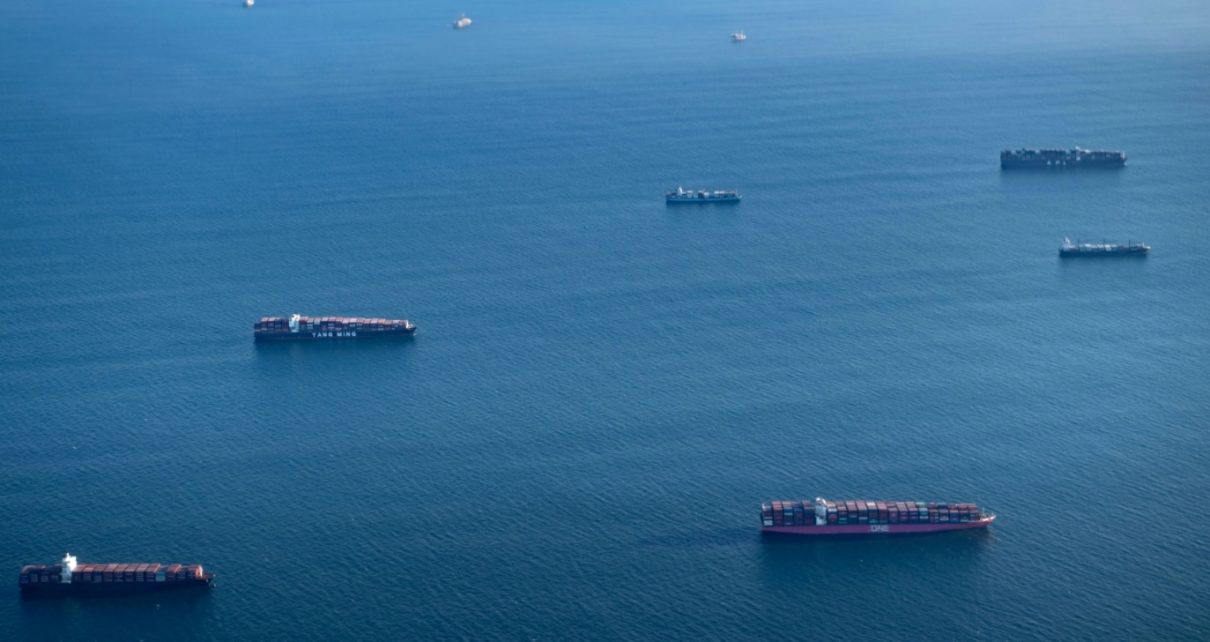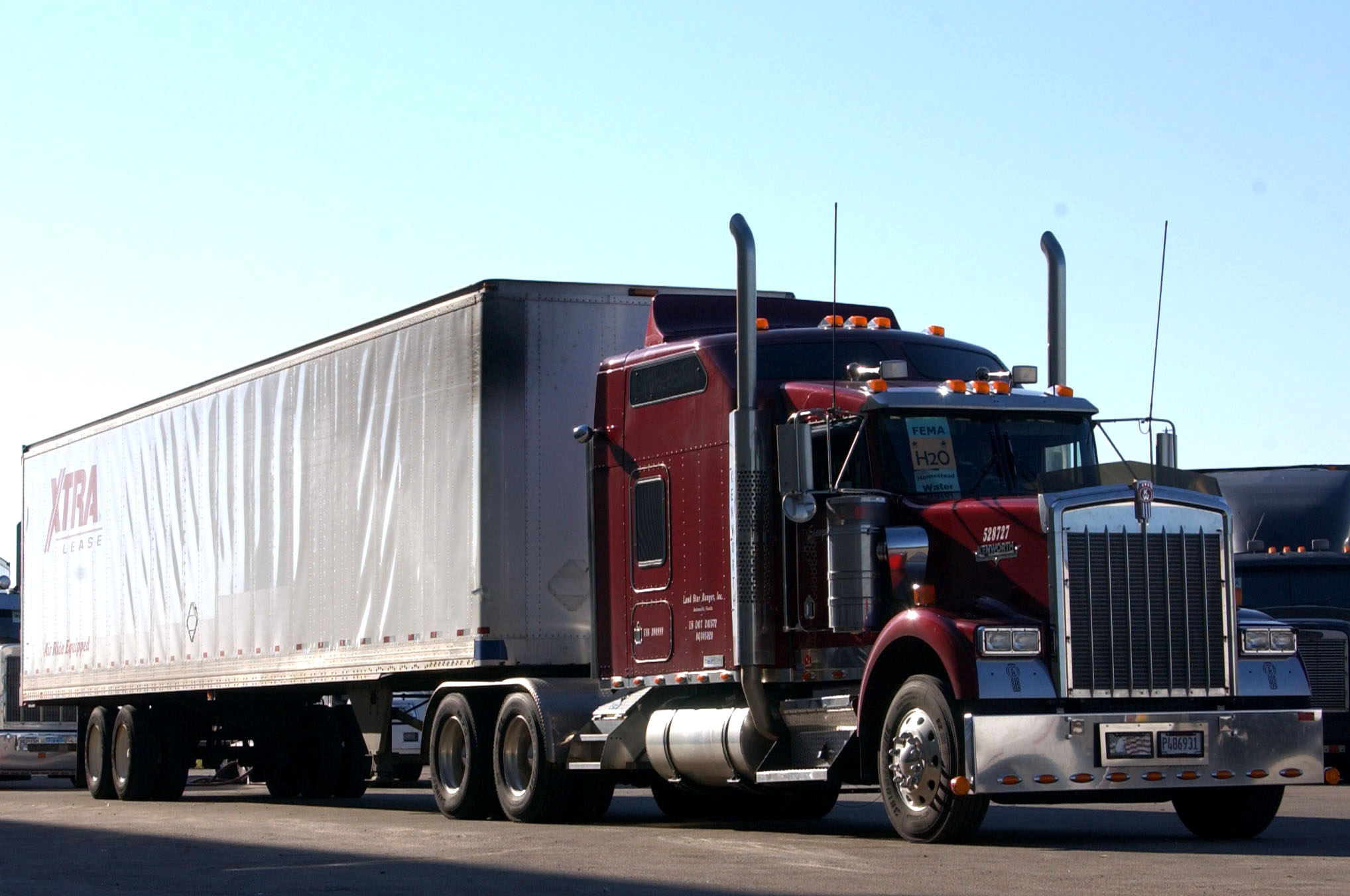
Container ships docked outside of Los Angeles (Photo: KTLA YouTube Screenshot)
Dock Workers Warned Officials of Potential Port Backlog Crisis; Maintain It’s Not Their Fault
The California Globe interviews dockworkers in Southern California.
By Evan Symon, October 22, 2021 3:42 pm
Dockworkers, represented by the International Longshore and Warehouse Union (ILWU), said on Friday that the port crisis is not their fault and that heightened measures, such as the National Guard being deployed to some ports, will not help alleviate the situation.
The Globe traveled across Los Angeles County on Friday and talked with several current and former dock workers about the current situation. While each had different experiences and felt differently about the crisis, all maintained that dock workers had nothing to do with the crisis.
“This isn’t a case of us saying to you ‘Well of course it’s not our fault.’ The reality is that we’ve been working no more or less harder than usual when ships started backing up,” said James, a dock worker of 16 years. “In practical terms, there’s not too many ways to speed up the process. We use container cranes to offload a ship, and those things tend to not really act with speed. You try and push it and that could end up causing damage. You can miss the trucks or trains. On the ground, you need to make sure the containers are unhooked and safely down. If we rush it, someone, somewhere will be hurt.”
Another dockworker also spoke up about this.
“Going faster is not an option, but being more efficient is,” said Russell, a former dockworker now working as a long-haul trucker, to the Globe on Friday. “We’re finally getting backing to modernize the process and remove roadblocks like weight limits to help clear off ships faster. Dock workers and truckers alike have been asking this for years. The whole process can suddenly stop if, say, and trucker with a bobtail (truck with no trailer) pulls around to get loaded or something like that. It throws everyone off their flow. Or if trucks can only take so much weight. It just ruins the efficiency.”
However, the largest part they don’t understand is how they and the ILWU have been ignored for over a year on the looming crisis.
“We’ve all had it in the back of our minds that something like this was going to happen,” added James. “For a lot of 2020, we saw record decreases in port traffic in both LA and Long Beach. Then we saw it come back with a vengeance in the second-half. For this year, with global trade resuming and many places eager to send off their own backlogged exports, we knew this flood was coming.”
A third dockworker, Eli, also weighed in.
“The trucks were big,” noted Eli, a dockworker who works closely with truckers coming into the port, on Friday. Some trucks can only take so much, and we began to see problems come up there.”
Shipping, trucking issues
An outside source, Cleveland-based shipping consultant George Pinsky, explained more into detail of the problem of trucking and big-picture thinking, to the Globe earlier this week.
“Truckers have been telling the government at every level that the industry would be facing a major shortage for years,” said Pinsky. “Right now we’re around 80,000 truck drivers short. It will be double that by the end of the decade.
“You can’t just focus on trucking, on shipping, on air freight, on rail. Everything needs to work together here. For truckers that means making long-haul trucking look better to newer generations who don’t want to do that, so that means more money for better wages, and generous amounts of time off similar to airline pilots. This isn’t like the late 70’s when everyone wanted to have a CB radio and be a trucker. And that’s not even getting into the driverless vehicles that are coming more widespread soon.”
“We need to boost train freight too, so that means freight expansion there because not everything can be trucked across country simply due to the volume. Ditto for air freight, which is usually the more expensive option. And shipping, we need to modernize ports and make things more automated. If that means less stevedores, it means we may have to do it, but a lot of other jobs will open up in the ports, and especially through short and long haul trucking, because of it. So that also means greater jobs services for all the transitions. This is what I mean about bigger picture.”
Within the ports currently backed up though, the blame over the issue is not clear cut.
“We’re all blaming each other,” added James. “We’re blamed for not going fast enough, but I’ve seen other workers blame the truckers, blame government, blame everyone.”
But there are two uniting factors: consumers and regulations.
“Regulations have really hurt longshoremen,” continued Russell. “Truckers too. Now, that Newsom Executive Order relieved a few of those things, as did Biden’s 24/7 order, but there are still a lot of archaic regulations that would help efficiency. Anything that isn’t safety oriented needs to be looked at.”
The role of consumers, more online shopping in port crisis
“Ask anyone and they will blame online orders,” said Eli. “When COVID hit, you expected a drop in shipping for a long time, but that didn’t happen. Instead more people shopped online, so shipping went up as a result. Still is by the way. We’re seeing record amounts come in on a pandemic level number of truckers. What did you think was going to happen?”
“There is no single solution to this, and I’m just a dockworker, but a big way to help would be to buy more locally or within America for a while. But that is not going to happen, because we are so tied with overseas shipping right now and bringing in things from Asia.”
“That’s really what screwed us. Dock workers went down, truckers went down, and all signs pointed to lower shipping. Except people kept ordering online and goods kept coming in. We kept up for awhile because not everywhere was shipping out due to COVID-19, but people didn’t stop ordering from overseas sources. We’ve needed to upgrade our ports for all this new cargo coming in, but we didn’t.”
James agreed, saying “That’s on the money. Warehouses on both sides are really fueling imports and exports because so much needs to go out or come in. We have containers being put onto open public land because there is no other place for them. And, well, the thing is it’s because, also, our economy is improving. It’s more online order focused. And even if we say ‘buy American,’ there are several pieces and parts that companies here need from overseas. And we can’t just say ‘stop shipping things out,’ because that would hurt more people than it helps.”
“From the perspective of dock workers, longshoremen, stevedores, whatever you want to call us, we knew about this problem, warned people, and are now stuck being partially blamed by people, despite doing everything we can and working as much as and as efficiently as we can within current regulations.”
More local, state, and federal action is expected soon to help further alleviate the port backlog crisis.
- Bill to Require Law Enforcement Disclosure if AI Was Used To Help Write Reports - August 7, 2025
- Gov. Newsom Files FOIA Request To ‘Expose True Cost’ Of L.A. Federal Troop Deployment for Anti-ICE Riots - August 6, 2025
- California Redistricting: How Newsom’s Plan Will Demolish Hard Fought GOP Gains - August 6, 2025





Let’s not forget the role of AB5 author/spokesmodel Lorena Gonzalez in this whole mess.
….. YES, definitely AB5 has devastated California in so many ways that are now coming home to roost. Also CARB, California Air Resources Board (un-elected bureaucrats —- is Mary Nichols still there heading it?) whose wacky regulations don’t allow trucks beyond a certain young age to travel in California. Probably diesel trucks verboten too. Having to constantly replace truck fleets ain’t cheap, to put it lightly.